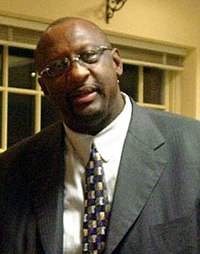Bob Lanier (basketball)

Lanier in 2004
|
|
| Personal information | |
|---|---|
| Born |
September 10, 1948 Buffalo, New York |
| Nationality | American |
| Listed height | 6 ft 10 in (2.08 m) |
| Listed weight | 250 lb (113 kg) |
| Career information | |
| High school | Bennett (Buffalo, New York) |
| College | St. Bonaventure (1967–1970) |
| NBA draft | 1970 / Round: 1 / Pick: 1st overall |
| Selected by the Detroit Pistons | |
| Playing career | 1970–1984 |
| Position | Center |
| Number | 16 |
| Career history | |
| As player: | |
| 1970–1980 | Detroit Pistons |
| 1980–1984 | Milwaukee Bucks |
| As coach: | |
| 1995 | Golden State Warriors |
| Career highlights and awards | |
|
|
| Career statistics | |
| Points | 19,248 (20.1 ppg) |
| Rebounds | 9,698 (10.1 rpg) |
| Blocks | 1,100 (1.5 bpg) |
| Stats at Basketball-Reference.com | |
| Basketball Hall of Fame as player | |
|
College Basketball Hall of Fame Inducted in 2006 |
|
Robert Jerry Lanier, Jr. (born September 10, 1948) is an American retired professional basketball player who played for the Detroit Pistons and Milwaukee Bucks of the National Basketball Association (NBA).
Lanier was inducted into the Naismith Memorial Basketball Hall of Fame in 1992.
Lanier was born in Buffalo, New York. Under coach Fred Szwejbka, he played at Buffalo's Bennett High School, where he graduated in 1966. He then played collegiately at St. Bonaventure University, in Allegany, New York.
Lanier was a three-time Converse All-America selection (1968–1970), and in 1970, he led St. Bonaventure to the NCAA Final Four. He was injured late in the regional championship game in a collision with Villanova's Chris Ford and did not participate in Bona's national semi-final loss to Artis Gilmore-led Jacksonville University. That year he was named Coach and Athlete Magazine player of the year, and the ECAC Player of the Year.
Lanier was drafted number one overall by the National Basketball Association's Detroit Pistons and was named to the All-Rookie Team for the 1970–71 season after averaging 15.6 points and 8.1 rebounds per game. Lanier became a star for Detroit, averaging more than 21 points per game for each of the next eight seasons, with a high mark of 25.7 PPG in the 1971–72 season, and more than 11 rebounds per game in seven straight seasons. Lanier's latter years in Detroit were marred by recurring injuries, as he never played more than 64 games in any of his last four seasons as a Piston.
...
Wikipedia
